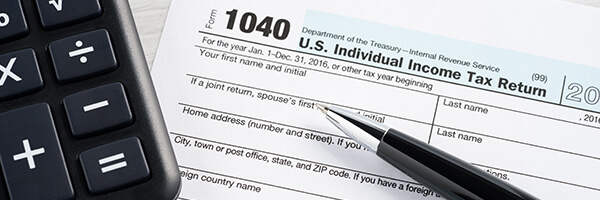
To a lot of people, “tax planning” means scheduling an evening (or evenings) for the annual ritual of gathering tax documents. If you have a complex financial situation, maybe you put away those documents that start coming in January and don’t think about your forms and schedules until you must.
When you finally do sit down to begin preparation of information and gathering of documents, you may be filled with a sense of dread the whole time you’re working. Will you owe money? What am I missing?
That’s the first reason why tax planning should be a part of your year-round financial planning: Your tax preparation won’t be a hurried, anxiety-ridden task. When you wait until the last minute, at least three things can go wrong:
- You’re missing one or more tax documents.
- You missed an opportunity to defer or avoid taxes.
- You have some kind of family emergency like illness or an injury, and you’re not going to make the deadline.
Regular Attention
Whether you call it that or not, you do a lot of financial planning. You probably have some idea of what your income and expenses will be for the next month. Maybe you even have a budget.
But do you think about the money you must pay to the IRS and state agencies as regularly as you consider what you’re spending on internet access and online subscriptions, for example?
If you do, you’re constantly aware of the impact that your expenses will have on your income taxes. When you need to make a major acquisition like equipment, how will this affect your taxes? Is it more advantageous to buy outright or to lease? Will you claim the entire expense in the current tax year or will you depreciate it? Do you need the tax break this year or should you put it off until January?
Year-round tax planning helps you make smarter business decisions. Besides making purchases with taxes in mind, you can create monthly and quarterly reports that track your income and expenses so that your quarterly estimated taxes are closer to the mark than if you just guessed – or worse, didn’t pay them.
Saving Money
Finally, year-round tax planning can help minimize your tax obligation. If you’ve been tax-aware all year, you’ll have some idea by November or December how your income is running in relation to your expenses, though of course you won’t know exactly until all your numbers are plugged into tax preparation forms. Should you defer some income into the next year? Spend money on things you need before January 1?
Tax planning can help you take advantage of the available tax benefits and deductions. Also, accounting applications make tax planning much easier. You can run customizable, pre-defined reports in seconds, and you can watch the ebb and flow of your income and expenses in real time. Please contact us for questions or assistance.
Recent News & Insights
Understanding Farm Income Averaging
Job Counteroffers: What You Gain & What You Risk
Maximizing Your Nebraska R&D Credit
What do buyers look for when purchasing a roofing business?




%20(1).jpg?width=300&height=175&name=Mega%20Menu%20Image%20(2)%20(1).jpg)
%20(1)-Mar-08-2024-09-27-14-7268-PM.jpg?width=300&height=175&name=Untitled%20design%20(6)%20(1)-Mar-08-2024-09-27-14-7268-PM.jpg)

%20(1)-Mar-08-2024-09-11-30-0067-PM.jpg?width=300&height=175&name=Untitled%20design%20(3)%20(1)-Mar-08-2024-09-11-30-0067-PM.jpg)
%20(1).jpg?width=300&height=175&name=Mega%20Menu%20Image%20(3)%20(1).jpg)
%20(1).jpg?width=300&height=175&name=Mega%20Menu%20Image%20(4)%20(1).jpg)
%20(1).jpg?width=300&height=175&name=Mega%20Menu%20Image%20(5)%20(1).jpg)
-Mar-08-2024-08-50-35-9527-PM.png?width=300&height=175&name=Untitled%20design%20(1)-Mar-08-2024-08-50-35-9527-PM.png)


.jpg)




